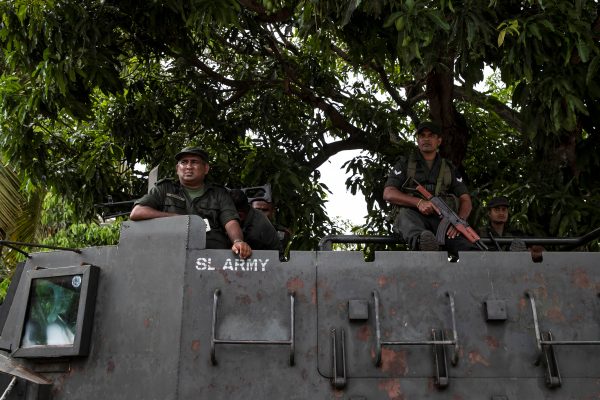Muslim citizens had alerted authorities to radicals within the NTJ. And Indian authorities provided detailed intelligence on the imminent attacks. The warnings went unheeded, partly due to the chaotic politics surrounding the President and Prime Minister. The Sri Lankan government, perhaps influenced by fundamentalist sentiments posted on social media, said that the 15 March 2019 mosque shootings in Christchurch, New Zealand influenced the bombers.
This is questionable. Ultimately the bombings may have less to do with the mosque shootings in New Zealand, or Sri Lanka’s improved military ties with the United States, than some suggest. Instead they may have more to do with IS signalling that it will continue to wage war despite losing territories in Iraq and Syria.
Sri Lanka experienced suicide bombings when the Liberation Tigers of Tamil Eelam (LTTE) fought a separatist war. The country gained tragic familiarity with suicide bombers then. But Sri Lankan Islamist suicide bombers are a new phenomenon. Since Easter Sunday, more suicide bombers have been detected. This suggests Islamist terrorism may affect the island for some time.
Global Islamism influences local radicalism. Sri Lanka is now another country that testifies to this. But the island must also look inwards, as tensions between Islamic culture and Sinhalese Buddhist nationalism contribute to extremism on the island.
An austere, puritanical, and uncompromising Salafi–Wahhabi strand of Islam is playing a leading role in radicalising many of Sri Lanka’s Muslims. This mainly happens when Sri Lankan Muslims, similar to those from the rest of South Asia, go to work in the Arabian Peninsula and return highly pious.
Some among the lower classes may have done so as a way to acquire status within their communities. Whatever the reason, embracing Middle Eastern attire, promoting Arabic, erecting mosques and madrassas, and censoring moderate Muslims for syncretic practices soon became more common. Sufis especially were denounced and targeted. Factions multiplied as groups splintered and acquired new Arabian-based sponsors. Thus NTJ broke off from the Thawheed Jamaath, which itself is among the dogmatic groups promoting the Salafi-Wahhabi brand.
The more extremist Salafi-Wahabi teachings are transforming Islam in Sri Lanka and estranging Muslims from others. Because some practices exacerbate segregation and insularity, this creates divisions among Muslims, and emphasises Muslim ‘otherness’ in conspicuous ways. Already Islamophobic Sinhalese Buddhist nationalists are finding the increasing numbers of mosques and thobe and burqa-wearing Muslims perturbing. Their hostility, and the anti-Muslim violence it spurs, is the second major reason for Muslim radicalisation.
Sinhalese Buddhist nationalism is a constant force fanning ethno-religious tensions in post-independence Sri Lanka. The island is a repository for Theravada Buddhism. But opportunistic politicians manipulate this status to promote majoritarianism. Even now, beneath the talk of inter-religious camaraderie following the bombings lurk forces determined to use the carnage for political gain. They aspire to rule ruthlessly via Sinhalese Buddhist domination and minority subordination.
This majoritarian mindset caused Tamils to be systematically marginalised. That led to a civil war lasting nearly three decades. But the tactics that the separatist LTTE pursued masked how successive governments’ ethnocentric policies spurred the war. The Easter Sunday bombings likewise minimise focus on how Sinhalese Buddhist nationalism may be contributing to Muslim extremism.
During the war, Sri Lanka’s Muslims opposed the Tamils’ separatist agenda. Their politicians lobbied the predominantly Muslim states to support the Sri Lankan government. Sri Lankan Muslims speak Tamil and those that lived near LTTE-controlled areas provided the military with intelligence. For this, the LTTE forced out over 60,000 Muslims living in Northern Province. In Eastern Province, it murdered Muslims while they prayed in mosques.
The civil war had barely ended when Sinhalese Buddhist radicals expressed their gratitude by turning against the Muslim community. In 2011 they demolished a nearly 300 year-old Muslim shrine. Three years later anti-Muslim violence, smacking of a pogrom, erupted in Aluthgama, a town south of Colombo. Victims claimed that some perpetrators appeared to be military personnel in civilian outfits. Throughout Aluthgama, a number of mosques and Muslim businesses were attacked. Then in 2018 anti-Muslim rioting erupted in the central part of the island.
Many Buddhist monks promote this violence. Neither they, nor their shock troops, have faced prosecution. National and local-level politicians have done little to confront the rioters. The police stood idly as bystanders.
Muslims are now tipping off extremists’ locations to security officials. The Sri Lankan state must better incorporate these people to de-radicalise Islamists and fight their terrorism. And the state must simultaneously defang Sinhalese Buddhist extremists. A state that refuses to protect a particular section of its population has no right to demand its loyalty.
Extremism in Sri Lanka will only cease when fundamentalist Muslims temper their enthusiasm for the more wayward elements of Salafi–Wahhabi Islam and the government cracks down on the rabid Sinhalese Buddhist nationalists. But achieving both may be too much to expect.
Dr Neil DeVotta is a Professor of Politics and International Affairs at Wake Forest University.

